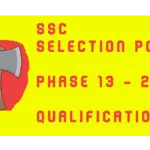The pursuit of government jobs in India is widely known for its intense competition, with millions of applicants vying for a limited number of positions. For any widely known exams such as CGL, CHSL or similar examination, getting below 150-160 out of 200 will take you to nowhere. However, the Staff Selection Commission (SSC) Selection Posts Examination offers a less conventional, potentially less competitive, route for candidates who possess specific qualifications and professional backgrounds. Here, you may comfortable secure your position in a Group-B post even after scoring around 130-140 marks only after normalisation. By focusing on specialized career paths, aspirants can navigate a landscape with significantly lower cut-off marks across all categories, facing a more manageable pool of competitors.
The SSC Phase-XII/2024 Selection Posts Examination conducted Computer Based Examinations for various posts across different educational qualification (EQ) levels: Graduation & above, Higher Secondary (10+2) Level, and Matriculation Level. While a staggering 10,30,119 applications were received for Graduation & above posts, 10,69,096 for Higher Secondary (10+2) posts, and 12,72,374 for Matriculation Level posts, the true competition for many roles is much narrower due to specific eligibility criteria.
The Advantage of Specialization: Less Competition, Lower Cut-offs
Unlike generalist positions that are open to a broad range of graduates, many SSC Selection Posts require highly specific educational qualifications, professional experience, or even certain certifications. This immediately reduces the number of eligible candidates, creating a distinct advantage for those who have invested in such specialized training.
The Staff Selection Commission sets minimum qualifying marks for the Computer Based Examination: 30% (60 marks) for UR, 25% (50 marks) for OBC/EWS, and 20% (40 marks) for all other reserved categories. As per SSC guidelines, the candidates are shortlisted for the next stage of scrutiny in a ratio of 1:30 for vacancies up to 5, and 1:15 for vacancies more than 5, subject to availability. For vacancies reserved for Persons with Benchmark Disabilities (PwBD) and Ex-Servicemen (ESM), all qualifying candidates meeting the minimum cut-off criteria are shortlisted for scrutiny, further highlighting how specific criteria can narrow the field.
Let’s look at some compelling examples from the recent Phase-XII/2024 examination results, highlighting how specific qualifications correlate with relatively lower cut-off marks for UR, OBC, and EWS categories:
Examples from Graduation & Above Level Posts:
- For Girl Cadet Instructor (GCI) (Post Code MP10624), which requires a Degree in any discipline and an NCC ‘C’ Certificate, the Unreserved (UR) category cut-off was 115.07063 marks. This is significantly lower than many other UR cut-offs for general graduate-level posts, which often exceed 150-170 marks.
- The Rehabilitation Counsellor position (Post Code ER14524) demands a Master’s Degree in Psychology and two years of practical experience. For the Unreserved (UR) category, the cut-off was 105.15171 marks. This reflects the specialized nature of the role and the reduced competition among a smaller pool of qualified applicants.
For Higher Secondary (10+2) Level Posts:
- The Lady Health Visitor position (Post Code WR13424) requires a 12th pass, a Diploma in Lady Health Visitor course, and one year of midwifery experience. For the Unreserved (UR) category, the cut-off was 75.42621 marks, demonstrating notably less competition for this specialized health-related role.
- For Health Worker (Female) (Post Code ER10124), demanding a 12th pass along with an Auxiliary Nurse Midwifery Certificate, the EWS category cut-off was 52.97383 marks. This is barely above the minimum qualifying mark for EWS (50 marks), illustrating a highly accessible pathway for those with this specific vocational qualification.
- The Foreman position (Post Code NW11624), requiring a Diploma in Mechanical/Automobile/Electrical Engineering with 5 years of experience, had an EWS category cut-off of 50.26743 marks, again very close to the minimum qualifying threshold for the category.
Early Entry through Matriculation Level Posts:
- The Technical Operator (Drilling) (Post Code MP11524) at the Matriculation level mandates a 10th pass and an ITI Certificate in Motor Mechanic or Diesel Mechanic or Fitter. For the EWS category, the cut-off was 91.57660 marks.
- The Driver-cum-Mechanic position (Post Code NR29924) requires a 10th pass, a valid driving license for light and heavy motor vehicles, three years of driving experience, and an ITI Certificate in Automobile Engineering/Motor Mechanic, along with passing a driving test. For the EWS category, the cut-off was 50.87289 marks, highlighting a very low threshold for candidates with these multiple specific certifications and experience.
- For MTS (Medical Attendant) (Post Code CR15324), which requires a 10th pass and a Certificate in First Aid, the EWS category cut-off was 124.07304 marks. While higher than some other specialized matriculation examples, it still reflects the benefit of having a specific, rather than general, qualification.
Why Does This Happen?
The cut-off marks, or “Total Marks” as seen in the results, are directly influenced by the number of suitable candidates available for shortlisting against the vacancies. When a job requires very specific educational qualifications, extensive experience, or specialized skill tests (such as typing speed or practical driving tests), the pool of eligible candidates shrinks drastically. Even if the number of available vacancies is small, the competition among the qualified candidates becomes less fierce compared to widely advertised generalist positions.
For example, a post needing an M.Sc. in a niche subject or a specific engineering diploma limits the applicant pool to only those individuals who have pursued that particular academic path. This is in contrast to a general “Graduate” level post, which could attract hundreds of thousands of applicants.
Charting Your Specific Career Path
If you’re aspiring for government jobs in India and seeking to avoid the intense competition of general examinations, consider the following:
- Research Specific Qualifications: Explore the detailed essential qualifications (EQ) required for various specialized posts. The sources clearly lay out the academic degrees, diplomas, and experience needed for each Post Code.
- Invest in Niche Education/Certifications: Pursuing a degree or diploma in specialized fields like specific branches of Engineering (e.g., Electronics, Drilling, Automobile), specialized Sciences (e.g., Entomology, Plant Pathology, Soil Science), Library Science, Medical Laboratory Technology, or even acquiring vocational training certificates (e.g., ITI in specific trades, NCC ‘C’ Certificate, First Aid Certificates) can open doors to less competitive roles.
- Gain Relevant Experience: Many specialized posts also require a certain number of years of experience in a specific field. Actively seek out opportunities to build this experience, as it can be a crucial differentiator.
- Master Required Skill Tests: For some posts, skill tests like specific typing speeds or practical driving tests are mandatory. Excelling in these can significantly improve your chances.
By strategically aligning your education and career development with these specialized government job requirements, you can significantly enhance your prospects and step into a more accessible pathway to public service.

